Related Research Articles
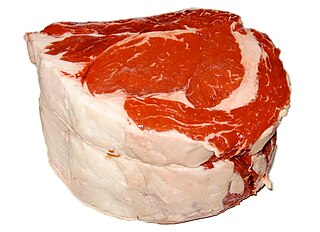
Beef is the culinary name for meat from cattle, particularly skeletal muscle. Humans have been eating beef since prehistoric times. Beef is a source of protein and nutrients.
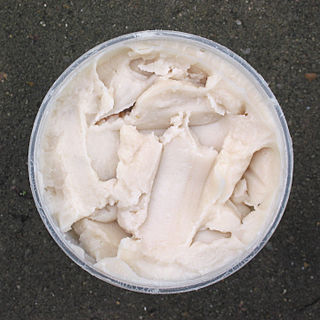
Animal fats and oils are lipid materials derived from animals. Physically, oils are liquid at room temperature, and fats are solid. Chemically, both fats and oils are composed of triglycerides. Although many animal parts and secretions may yield oil, in commercial practice, oil is extracted primarily from rendered tissue fats obtained from livestock animals like pigs, chickens and cows. Dairy products also yield popular animal fat and oil products such as cheese, butter, and milk.
Quorn is a meat substitute product originating in the UK and sold primarily in Europe, but is available in 14 countries. Quorn is sold as both a cooking ingredient and as the meat substitute used in a range of prepackaged meals.

Mechanically separated meat (MSM), mechanically recovered/reclaimed meat (MRM), or mechanically deboned meat (MDM) is a paste-like meat product produced by forcing pureed or ground beef, pork, mutton, turkey or chicken, under high pressure through a sieve or similar device to separate the bone from the edible meat tissue. It is sometimes called white slime as an analog to meat-additive pink slime and to meat extracted by advanced meat recovery systems, both of which are different processes. The process entails pureeing or grinding the carcass left after the manual removal of meat from the bones and then forcing the slurry through a sieve under pressure. This puree includes bone, bone marrow, skin, nerves, blood vessels, and the scraps of meat remaining on the bones. The resulting product is a blend primarily consisting of tissues not generally considered meat along with a much smaller amount of actual meat. In some countries such as the United States, these non-meat materials are processed separately for human and non-human uses and consumption. The process is controversial; Forbes, for example, called it a "not-so-appetizing meat production process".
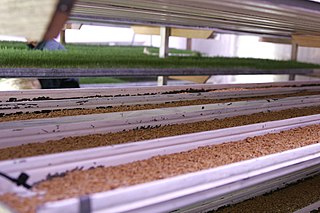
Fodder, also called provender, is any agricultural foodstuff used specifically to feed domesticated livestock, such as cattle, rabbits, sheep, horses, chickens and pigs. "Fodder" refers particularly to food given to the animals, rather than that which they forage for themselves. Fodder includes hay, straw, silage, compressed and pelleted feeds, oils and mixed rations, and sprouted grains and legumes. Most animal feed is from plants, but some manufacturers add ingredients to processed feeds that are of animal origin.

Rendering is a process that converts waste animal tissue into stable, usable materials. Rendering can refer to any processing of animal products into more useful materials, or, more narrowly, to the rendering of whole animal fatty tissue into purified fats like lard or tallow. Rendering can be carried out on an industrial, farm, or kitchen scale. It can also be applied to non-animal products that are rendered down to pulp.
The term meat industry describes modern industrialized livestock agriculture for production, packing, preservation marketing of meat. In economics, it is a fusion of primary (agriculture) and secondary (industry) activity and hard to characterize strictly in terms of either one alone. The greater part of the entire meat industry is termed meat packing industry- the segment that handles the slaughtering, processing, packaging, and distribution of animals such as poultry, cattle, pigs, sheep and other livestock.

Findus is a frozen food brand which was first sold in Sweden in 1945. Findus products include ready meals, peas and Crispy Pancakes, the latter of which were invented in the early 1970s.

An animal product is any material derived from the body of an animal. Examples are fat, flesh, blood, milk, eggs, and lesser known products, such as isinglass and rennet.
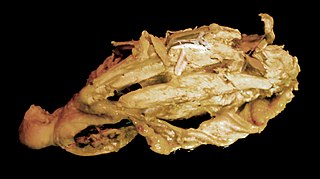
The European Union's Animal By-Products Regulations allows for the treatment of some animal by-products in composting and biogas plants. The following article describes procedures required to allow solid outputs from composting plants and anaerobic digesters onto land in the United Kingdom.

Faccenda Foods Limited is a privately owned UK business established in 1962 by Robin Faccenda, which supplies fresh poultry products.

Intensive animal farming or industrial livestock production, also known by its opponents as factory farming, is a type of intensive agriculture, specifically an approach to animal husbandry designed to maximize production, while minimizing costs. To achieve this, agribusinesses keep livestock such as cattle, poultry, and fish at high stocking densities, at large scale, and using modern machinery, biotechnology, and global trade. The main products of this industry are meat, milk and eggs for human consumption. There are issues regarding whether intensive animal farming is sustainable or ethical.

Bovine spongiform encephalopathy (BSE), commonly known as mad cow disease, is a neurodegenerative disease of cattle. Symptoms include abnormal behavior, trouble walking, and weight loss. Later in the course of the disease the cow becomes unable to function normally. The time between infection and onset of symptoms is generally four to five years. Time from onset of symptoms to death is generally weeks to months. Spread to humans is believed to result in variant Creutzfeldt–Jakob disease (vCJD). As of 2018, a total of 231 cases of vCJD had been reported globally.
Cranswick plc is a leading UK food producer and supplier of premium, fresh and added-value food products. The company is listed on the London Stock Exchange and is a constituent of the FTSE 250 Index.
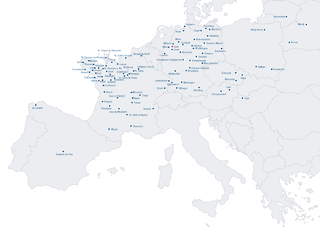
SARIA Bio-Industries AG & Co. KG is a company group based in Selm and active throughout Europe. The company acts as a service provider for agricultural and food sectors, as a producer of new forms of energy, and as a manufacturer of products for human consumption, pet food, aquaculture, oleochemistry and agriculture. SARIA is one of the largest companies of its kind in Europe and is owned by family-run Rethmann Group.

Meat and bone meal (MBM) is a product of the rendering industry. It is typically about 48–52% protein, 33–35% ash, 8–12% fat, and 4–7% water. It is primarily used in the formulation of animal feed to improve the amino acid profile of the feed. Feeding of MBM to cattle is thought to have been responsible for the spread of BSE ; therefore, in most parts of the world, MBM is no longer allowed in feed for ruminant animals. However, it is still used to feed monogastric animals.

2 Sisters Food Group is a privately owned food manufacturing company based in Wakefield, England.
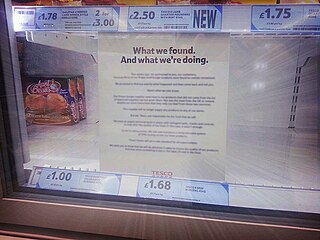
The 2013 horse meat scandal was a food industry scandal in parts of Europe in which foods advertised as containing beef were found to contain undeclared or improperly declared horse meat – as much as 100% of the meat content in some cases. A smaller number of products also contained other undeclared meats, such as pork. The issue came to light on 15 January 2013, when it was reported that horse DNA had been discovered in frozen beefburgers sold in several Irish and British supermarkets.
The Leo Group is a privately owned, waste-recycling company based in Halifax, England that specialises in the collection and processing of animal by-products. The company is currently run by Daniel Sawrij, the managing director, who took over from the company's founders, his parents Margaret and Leo Sawrij, in 1988.
References
- 1 2 "SARIA Ltd | PDM Group". pdm-group.co.uk. Retrieved 23 March 2014.
- ↑ "Prosper De Mulder". Yorkshire Post. Retrieved 23 March 2014.
- ↑ "Anaerobic Digestion | PDM Group". pdm-group.co.uk. Retrieved 23 March 2014.
- ↑ "SARIA: Newsausgabe Saria". www.saria.com. Retrieved 25 June 2020.
- ↑ "Notice of proposal to release Undertakings given pursuant to section 88 of the Fair Trading Act 1973". Archived from the original on 19 March 2014. Retrieved 9 February 2014.
- ↑ "The Pricing practives of PDM and Forrest" (PDF). Webarchive.nationalarchives.gov.uk\. Archived from the original (PDF) on 19 January 2012. Retrieved 27 February 2015.
- 1 2 "Gang guilty of £2.5m rotten poultry scam | UK news | The Guardian". theguardian.com. Retrieved 23 March 2014.
- 1 2 3 Stokes, Paul (23 December 2000). "Condemned meat fraudsters jailed - Telegraph". London: telegraph.co.uk. Retrieved 23 March 2014.
- ↑ "UK: FSA investigates beef dripping error". just-food.com. Retrieved 23 March 2014.
- ↑ "Animal waste factory hit with record fine". newham.gov.uk. Retrieved 23 March 2014.
- ↑ "The Chartered Institute of Environmental Health -". cieh.org. Retrieved 23 March 2014.
- ↑ "Early day motion 1006 - PROSPER DE MULDER AND THE CONSERVATIVE PARTY - UK Parliament". parliament.uk. Retrieved 23 March 2014.
- ↑ "Single British Firm May Have Spread Mad Cow Worldwide". Sunday Times. Archived from the original on 10 August 2001. Retrieved 23 March 2014.